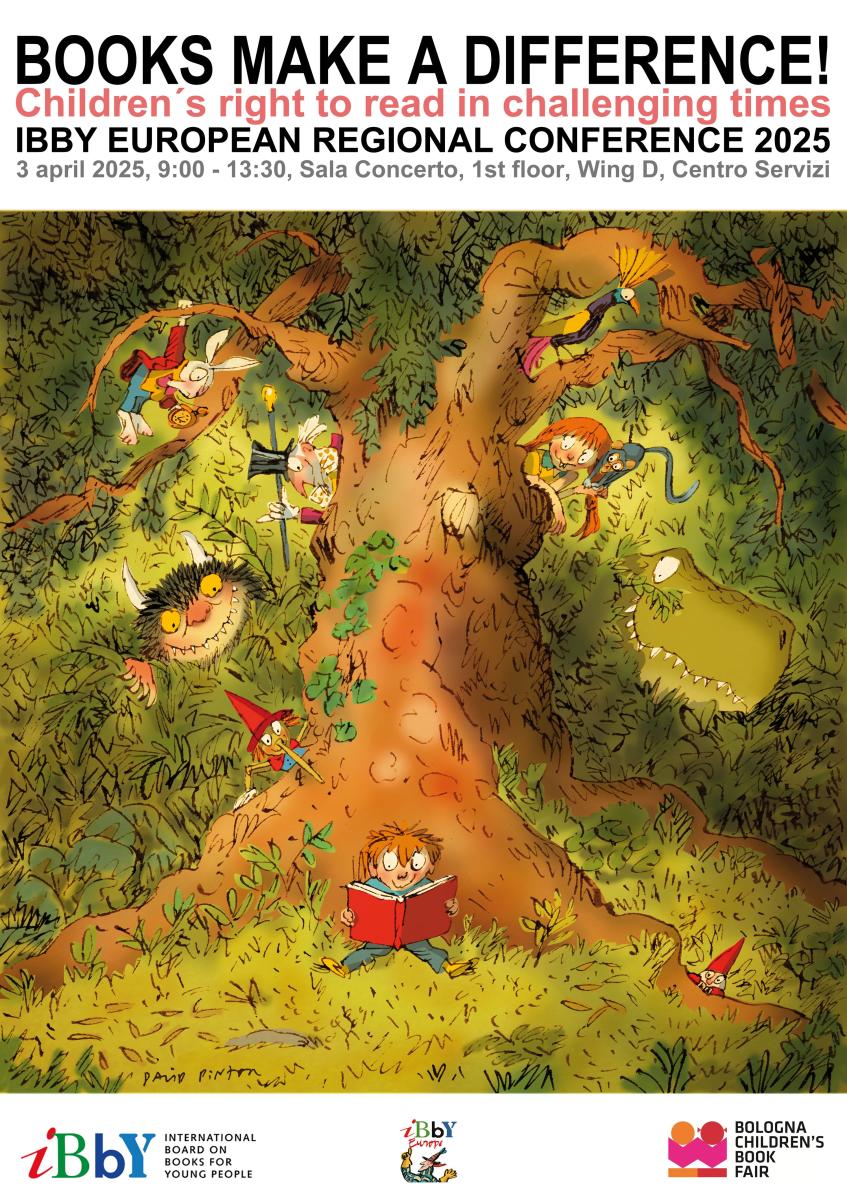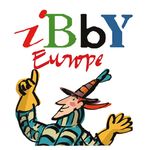Books make a difference!
Children’s right to read in challenging times

Every child has the right to read.
To read about the sun and the moon, about mermaids and knights, about unicorns and athletes... but also about ideas. Ideas that challenge, stimulate, help children to understand the world around them, to understand their rights and responsibilities.
Books can offer shelter, a place of escape, give hope and raise awareness. Stories help us to identify with others, to put ourselves in their shoes. They remind us that we are not alone - others are in the same situation. Books take us beyond the boundaries of our imagination and fill us with ideas for a different, better world.
This is the power of stories.
Books make a difference.
But what happens when censorship and political interference take hold?
This was the question addressed by the IBBY European Regional Conference, held on the last day of the International Children's Book Fair in Bologna on 3 April 2025. Under the title "Books Make the Difference! The Right of Children to Read in Difficult Times", the conference provided a space for reflection and international dialogue, calling for collective responsibility in times of growing uncertainty.
The conference brought together more than a hundred participants from thirty-three different countries, united by a shared belief: that defending the right of children to read freely is not only necessary, but urgent. As Europe is facing an era of political, social and economic change it has become clear that culture, education and children's literature cannot remain on the sidelines in such times. Children's books are a powerful tool for transmitting political, social, educational and moral ideas. And the adults who create them or make them available to children must be free from censorship and political interference to protect children's fundamental right to read, be heard and have access to a wide range of books.
Welcomes and keynote speech
The day opened with welcomes from Elena Pasoli (Bologna Children’s Book Fair Director), Basarat Kazim (IBBY President), and Laia López Arboleda (IBBYcat), followed by a compelling keynote from Belgian journalist and human rights advocate Eva Berghmans.
In her talk, “The Right to Read: Understanding Its Full Scope for Reading Promotion,” Berghmans affirmed reading as a fundamental childhood right, clearly setting out the current human rights and legal situation and explored the complex challenges of protecting that right in destabilized contexts. She spoke of the clash between values and norms—the tension between censorship and protection—and framed the day’s discussion in ethical as well as political terms.
Panel 1: Cultural Freedom in Times of Political Instability
Moderated by Doris Breitmoser (IBBY Germany), the first panel brought together Valentina Stoeva (Children’s Books Foundation, Bulgaria), Ken Wilson-Max (author, illustrator and children’s books publisher, Zimbabwe/UK), Mateusz Świetlicki (University of Wrocław, Poland), and Marie Aubinais (ATD Quart monde – Street libraries, France). Together, they painted a clear picture of the rise in censorship and the shrinking space for cultural freedom. Their testimonies, each from a very different professional perspective, made it clear that the right to create, publish, and share literature that tackles complex or controversial themes must be protected—especially when society is in crisis. They shared ideas, actions, and smiles that radiated positivity.
Panel 2: Freedom of Expression and the Voice of Young People
The second panel, “Seen and Heard: Young People's Voices and Freedom of Expression,” moderated by Pam Dix (IBBY UK), focused on empowering children and adolescents through literature. Nicky Parker (Amnesty International Poland, UK), Fariba Schulz (Humboldt-Universität zu Berlin and Universität Potsdam, Germany), Gvantsa Jobava (International Publishers Association President, Intelekti Publishing, Georgia), and Chris Riddell (illustrator, UK - joining via video from Brighton, UK) explored how stories can amplify children’s voices and offer tools for critical thinking, expression, and resilience. Chris Riddell’s live online illustration brought the conversation to life visually, sketching the spirit of the dialogue.
Nicky Parker and her colleagues presented the European-funded project Seen and Heard, which focuses on developing children's voices and creative expression to explore and be confident in talking about their rights. Gvantsa Jobava spoke powerfully and movingly about the recent protests by cultural organizations
in Georgia, her home country. At each protest participants carry a book. This panel demonstrated that freedom of expression can serve as an educational and liberating tool from an early age.
David Pintor
A special moment of the conference was dedicated to the work of Galician illustrator David Pintor. Known for his poetic and committed style, Pintor designed the conference poster. An exclusive interview with him offered deeper insight into his artistic vision and his longstanding collaboration with IBBY Europe, for which he has illustrated conference posters, newsletters and more for over ten years. This gave attendees the opportunity to gain insight into his artistic vision, his relationship with books, and the symbolism behind the poster's image of a tall tree representing resistance in the face of adversity.
Closing - A Call to Action
IBBY Europe is closely following developments and challenges and with the support of the Bologna International Children's Book Fair has taken a step with this conference: to make the voices and opinions of professionals and experts involved in the children's book sector heard.
In the closing session, I had the honour of summarising the day’s themes and discussions on behalf of the organizing committee. During the day, it became clear that it is our collective responsibility to look for innovative ways to support children's right to read. We need a children's literature that not only respects but also empathizes with children - a literature that reflects their experiences, acknowledges their feelings and inspires their dreams. Such literature must be free from censorship and political interference, offer young readers the opportunity to explore diverse perspectives and cultivate their critical thinking. We must find effective ways to support one another when facing challenges or attacks and agree on the most suitable communication channel to stay connected during such times.
A call to action then followed, encouraging all those present to act based on the inspiration and ideas arising from the discussions. It is vital that we support policies that ensure children have access to books. It is vital to strengthen initiatives that foster a love of reading. The objective is to create literature that empowers and gives voice to children's experiences. To achieve this, it is essential that we commit to defending every child's right to read and to creating a world where literature acts as a beacon of freedom, empathy and growth.
Throughout history, humanity has faced many challenges. But perhaps the most critical challenge is always the same: How do we, each of us, respond individually and collectively? Can we be, like the tree in David Pintor's image on the conference poster: upright, rooted, resilient, the tree that protects what is of real value? The right of children to read.
It is in our hands.
The proceedings of the conference concluded with a heartfelt thank you to the organizing committee— Doris Breitmoser, Hasmig Chahinian, Eva Devos, Pam Dix, Sabine Fuchs, Laia López, and Marta Roig.
Charalambos Demetriou
(Member of the Conference Organizing Committee, Cyprus IBBY, Member of the IBBY Executive Committee - Liaison Officer for Europe)
